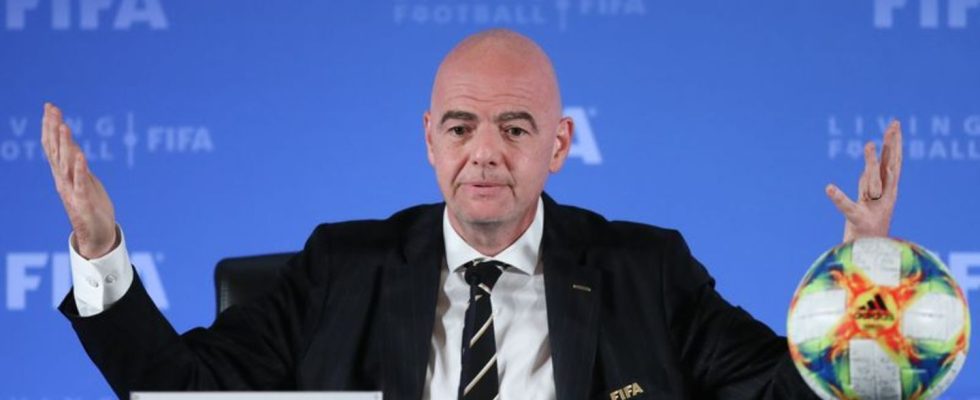By awarding the 2030 World Cup to six countries, FIFA is creating facts. Saudi Arabia is now considered safe as host in 2034. Transparency and human rights play subordinate roles.
Before criticism of the “vicious circle of destruction” really gained momentum, Gianni Infantino sold the controversial coup as a win for the whole world.
Smiling with satisfaction and in a pastoral voice, the FIFA President announced the “historic agreement” for a controversial three-continent World Cup in 2030, with which the world football association, in the best of backroom politics, also gave Saudi Arabia the red carpet as World Cup host for 2034 rolled out.
“Dialogue and mutual understanding”
“Dialogue and mutual understanding” led to this agreement in which “actually everyone wins – especially the fans, players and all regions of the world,” claimed the Swiss in a video speech after the FIFA Council’s surprising decision on Wednesday. Without saying a word about the World Cup’s problems in terms of sustainability, transparency and human rights, Infantino preached: “In a divided world, football is united.”
But that’s exactly what many people see differently after the council went it alone again. “FIFA continues its vicious circle of destruction against the biggest tournament in the world,” wrote the fan organization Football Supporters Europe (FSE) on the short message service X (formerly Twitter).
“We screw and screw and screw and come up with something else,” said RB Leipzig coach Marco Rose, full of incomprehension: “At some point we’ll play on Mount Everest because we can conjure up a football pitch there and we can market it.”
Money beats tradition
Money beats tradition – this message will be spread with the anniversary World Cup to mark the 100th anniversary of the final tournament in the six countries Uruguay, Argentina, Paraguay, Spain, Portugal and Morocco, say critics. “If the result of this bloated tournament is that only six countries together or only autocratic regimes can apply, that is not beneficial for human rights,” said FSE spokesman Martin Endemann to the German Press Agency.
In fact, Saudi Arabia can also feel like a big winner. Since the 2026 World Cup will be played in the USA, Mexico and Canada, only representatives from Asia and Oceania will be eligible to host the mega event in eleven years according to the rotation principle. This increases the chances of the monarchy in the Persian Gulf enormously, even if Australia is also examining a possible bid for the 2034 World Cup. But twelve years after the World Cup in politically hostile Qatar, Saudi Arabia itself wants to carry out the prestigious project with all its might. There is no shortage of money, contacts and good promises.
The aim is to organize a world-class tournament and be inspired “by Saudi Arabia’s ongoing social and economic transformation and the country’s deep-rooted passion for football,” said a statement from the national football association SAFF. Sheikh Salman bin Ibrahim Al Chalifa, President of the Asian Confederation AFC, pledged the support of the “entire Asian football family” and spoke of a “significant initiative by the Kingdom”.
Saudi Arabia harshly criticized
However, Saudi Arabia, even more than Qatar, is heavily criticized for human rights violations. The country is accused of wanting to burnish its image by investing billions of dollars in sport. The transfers of superstars such as Cristiano Ronaldo, Neymar and Karim Benzema to the Saudi Arabian football league are an example of this. The country has already secured hosting of the 2023 FIFA Club World Cup and the 2027 Asian Cup. A Formula 1 race, major boxing fights, its own golf series and the Asian Winter Games in 2029 will also take place there.
“In connection with the World Cup in Qatar, there was criticism that the grievances should have been pointed out much earlier in the award process,” said Endemann from Football Supporters Europe: “With regard to Saudi Arabia, we have to do that now.”
And where is the German Football Association? Since the decision was unanimous, according to FIFA’s announcement, DFB President Bernd Neuendorf, who was appointed to the powerful council in April, must also have agreed. Fully aware of the consequences for 2034. One thing is clear: the DFB must not rebel too much within the internal circle if it wants to maintain its chances for the 2027 Women’s World Cup, which will be awarded at the congress in Bangkok next May.
Infantino more powerful than Blatter?
With such tricks, Infantino keeps the opposition in check; he appears to be more powerful than his controversial predecessor Joseph Blatter ever was. This is also why he was able to circumvent the official rules of the game again and announce the tournament, which was actually supposed to be awarded at a FIFA congress next year, now and without involving the highest and legislative body. The members of the general assembly only have the task of officially confirming the decision.
Since the European Football Union has also bagged virtually secure deals outside of the committees for the European Championships in 2028 (United Kingdom and Ireland) and 2032 (Turkey and Italy), the hosts of the next six major football events are all but certain. Transparency played a subordinate role in the procedures.
Just like the topic of sustainability. Infantino promises a “unique global football footprint” – but what about the CO₂ footprint? Because there are only three games on South American soil, it should even look better than the previous World Cup in the USA, Canada and Mexico. Nevertheless, the decision is a symbol of rampant gigantism and is therefore “out of time” and further proof that “climate protection plays a subordinate role for FIFA,” criticized Stefan Wagner from the organization “Sports For Future”.

